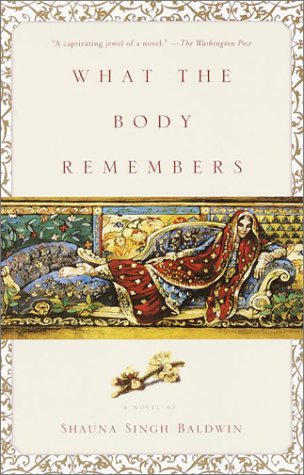[amazon_link id=”0385496052″ target=”_blank” container=”” container_class=”” ] [/amazon_link]Title : What The Body Remembers
[/amazon_link]Title : What The Body Remembers
Author : Shauna Singh Baldwin
Genre : South-Asian
Publisher : Doubleday (Random House)
Pages : 471
Rating : 4/5
While I’ve read many female-centric desi novels, I’ve read very few stories of women during partition, and even fewer from Punjabi writers. In WTBR, there are two women, both bound to one man. Satya is Sardarji’s first wife, strong and intelligent, but unable to give Sardarji the children he so desires. So after 26 years of marriage, at 42, wealthy Sardarji takes a second wife, Roop. All of 16 years old, Roop is the daughter of “Dipty” Bachan Singh, an authoritative figure of modest means. Motherless, and naïve in her belief of happiness, Roop marries Sardarji, hoping for a sister-like bond with her “saukan”. The bond never develops because Satya cannot countenance Roop, and plots and schemes to make her life miserable.
Sardarji is mostly oblivious to the war between the wives, and continues viewing them, according to Roop, through “the corners of his eyes” – like all men view women. This theme is often repeated as Baldwin brings home the fragility and insecurity of women living in a strongly patriarchal world, their every action a response to a man’s bidding. There is Roop, one of three children and the more beautiful of Bachan Singh’s two daughters (hence the name Roop, which means beauty). Cosseted by her father, Roop and her sister Madani are treated to rudimentary education even as their brother Jeevan is encouraged for higher studies. The realization that even her loving father is more concerned with his “izzat” than his daughters’ well-being, that he is just like all other men, seeing women but not really seeing them, hits hard, and is one of the more moving moments in this novel.
Then there is Satya (the name means truth) unable to lower her grey eyes before Sardarji, or to tamp down the many questions that Sardarji cannot answer. Capable and intelligent Satya cannot deny that her life and fate are tied to Sardarji’s – a man she truly loves – goodwill and favor, but even so cannot forsake her almost feminist beliefs. His ego appeased by the unquestioning adoration of his little-brown-koel Roop (Roop is learning fast), Sardarji tires of a strident Satya, and her influence slowly ebbs, but not before she delivers two cruel blows to Roop’s happiness. As the political climate changes, and partition becomes a reality, Roop must heal herself and be strong for her children, and Sardarji. A brave new world awaits, if they make it across the newly drawn border between Pakistan and India.
Baldwin’s language is laced with vernacular Punjabi, and her descriptions are languorous and all-seeing. Rich details serve to open up before us the wounds of betrayal and despair that are inflicted on Satya and Roop, both mere pawns in male-controlled destinies.
Roop waits for him to ask her so she might say it, but he does not ask at all, he assumes she will want what he wants. Sardarji’s suggestion is to assist her in learning his wishes, every woman is a Sita to her Ram, and what Ram wants, Sita will enjoy doing.
Roop has been conditioned to speak softly, never give any trouble, “never feel bad”, however unjust the circumstance, and she tempers this learning with her sister-in-law Kusum’s common-sense – say “haanji” to all questions, but do not obey immediately. Even as we get to hear from both Satya and Roop, it is quite amazing to note that neither one of them rebels outright, or questions the unfairness of it all, but work within the pre-ordained social order, haranguing the women below them and kow-towing to the men above.
She absorbs Bachan Singh’s fears, just as her mama did while confined in purdah, and ripens them to fullness. For Roop’s heart has become a storeroom where Bachan Singh hoards the full measure of her giving. That young heart presses like a coiled steel spring against her breast. Heart that does not venture outside the haveli for fear of Bachan Singh’s displeasure, heart afraid to glance at or speak to an unrelated man in the village unless he be a small boy or a white-bearded elder for fear of what-people-will-say. Heart that beats hard and fast as a table in her chest if her chunni falls but once, for a moment, to her shoulders, lest a man be smitten becasue Roop tempted him.
By now, Bachan Singh, Gujri, Revati and Kusum have done their duty well: Roop has learned shame.
Roop has come to dread what-people-will-say.
In this book, Baldwin touches upon many evil social traditions and practices, cruelties meted upon women by other women wishing to remain in the good books of the all-powerful patriarchs. Some remain to-date, and some have thankfully almost disappeared. WTBR is a reminder then, that wars are fought on women’s bodies, whether they be the overt physical brutalities that occurred during partition, or the subliminal cruelties of forcing women to live life on tenterhooks and jostle for power as subservient, dependent daughters, sisters and wives.

